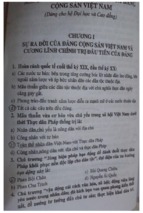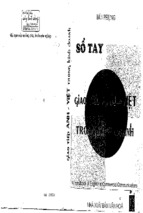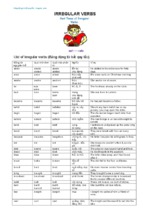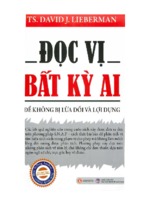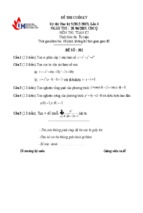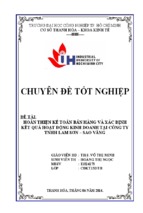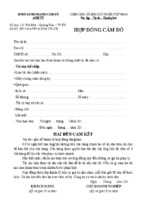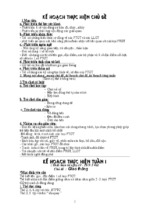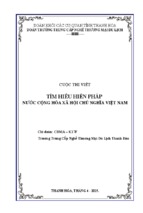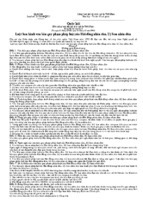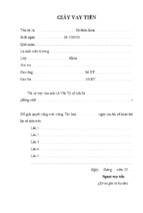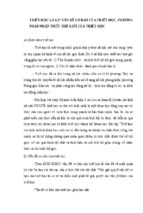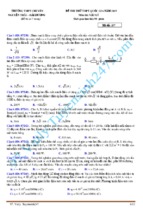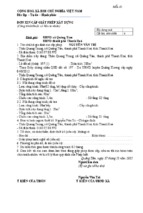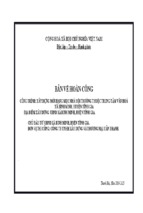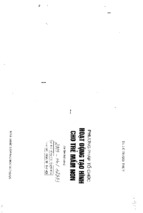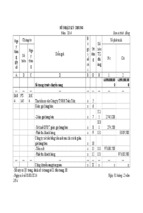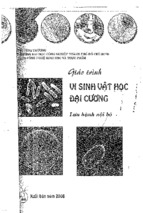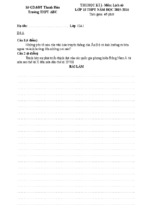ĐẠI HỌC MỞ HÀ NỘI
KHOA TIẾNG ANH
GIÁO TRÌNH
ĐẤT NƯỚC HỌC
THE SOCIETY
OF
MAJOR ENGLISH-SPEAKING COUNTRIES
Hà Nội - 2019
HANOI OPEN UNIVERSITY
FACULTY OF ENGLISH
THE SOCIETY
OF
MAJOR ENGLISH-SPEAKING COUNTRIES
Edited by: Le Thi Vy
Ngo Thi Thanh Thao
Luu Chi Hai
Nguyễn The Hoa
Nguyen Thanh Binh
Le Anh Tuyet
INTRODUCTION
This course book, adapted from a variety of invaluable materials, is structured
for learners of English as a foreign language at any level of proficiency from
intermediate upwards.
This material is expected to be for students who want to get general views of the
society of the countries where English is used as the official language. Students
may have a chance to get access to the history, the constitution, the people, the
education, the economy…. of many parts of the world which they may find far
away from each other in the map but very close in terms of language.
Aims and Objectives of the Course
The learners would be able to:
achieve thorough understanding about the history, the discovery
and foundation as well as the development of the countries
know geographical conditions of the countries influencing
people’s life
be able to clarify the political systems: the monarchy and republic;
the power and the roles of the Head of State, the constitutional
systems…
have knowledge of native people and the present population,
including their races, the class system in the society……
have general views on the economy, education … of the Englishspeaking world.
CONTENTS
Chapter 1:
The United Kingdom
of Great Britain and Northern Ireland
Unit 1: A Brief Introduction to the United Kingdom
6
Unit 2: The Government of the United Kingdom
28
Unit 3: Politics, Class and Race
40
Unit 4: The British Economy
51
Unit 5: British Education System
59
Unit 6: British Foreign Relations
71
Chapter 2:
The United States of America
Unit 7: American Beginnings
83
Unit 8: The Political System in the United States
96
Unit 9: The American Economy
109
Unit 10: Education in the United States
116
Unit 11: Social Problems in the United States
127
1
Chapter 3:
Canada
Unit 12: The Country and Its Peopl
139
Unit 13: The Government and Politics of Canada
148
Unit 14: The Canada Mosaic
154
Chapter 4:
Australia and New Zealand
Unit 15: The Land and the Peoples of the Dreaming
167
Unit 16: From Penal Colony to “Free Migration”
177
Unit 17: Australia as a Liberal Democratic Society
186
Unit 18: New Zealand: Land, People and History
197
2
Chapter 1:
The United Kingdom
of Great Britain and Northern Ireland
This chapter offers an overview to the United Kingdom. It includes
the foundation of the UK, the political system, the class, the race, the
economy, the educational system, and the British foreign relations.
3
The United Kingdom of
Great Britain and Northern Ireland
4
The Union Jack (British Flag)
Queen Elizabeth II
Prime Minister Boris Johnson
5
Unit 1: A BRIEF INTRODUCTION TO THE
UNITED KINGDOM
Focal points:
1. a complicated country with a complicated name
2. the significant role of London
3. cultural and economic dominance of England
4. invasion from the Roman Empire
5. settlement of the Anglo-Saxons
6. physical features of Scotland
7. independence of Scotland for 300 years
8. union with England in 1707
9. brief introduction to Wales
10. population and physical features of Northern Ireland
11. partition of Ireland in 1921
Area:
total 244820 sq km
Land:
241 590 sq km
Water:
3230 sq km (Including Rockwall and Shetland Islands)
Population: more than 67 million (17/09/2019)
An Overview to the United Kingdom
The full name of the country is the United Kingdom of Great Britain and
Northern Ireland. It is a highly centralized and unitary state, and its main
component, England, has been so for thousand years. As a political entity,
however, Britain (is the UK loosely called) is being the state which emerged
from the union of the ancient kingdoms of Scotland and England in 1707.
To the west of the continent of Europe lie two large islands called the British
Isles. The larger of these, consisting of England, Scotland and Wales, is known
as Great Britain. The smaller island is Ireland, with Northern Ireland and the
Irish Republic. England is the southern and central part of Great Britain.
Scotland is in the north of the island, and Wales in the west. Northern Ireland is
6
situated in the north-eastern part of Ireland. England, Scotland, Wales and
Northern Ireland form the United Kingdom of Great Britain.
Most people know something about the country because its huge overseas
empire gave it an important international role which only came to an end in the
years following the Second World War. However, the things that people know
about the UK (which they will probably call simply Britain or, wrongly,
England) may have little to do with how most real British people live their lives
today.
Windsor Castle
For one thing, the days of empire are now long enough ago that only old people
remember it as anything of any importance in their lives. Britain is no longer an
imperial country, though the effects of its imperial past may be often
encountered in all sorts of ways; not least in the close relationships which exist
with the fifty or more countries which used to be a part of that empire, and
which maintain links through a loose (and voluntary) organisation called the
Commonwealth of Nations. But more important today in Britain's international
relations is the European Union of which the UK has been a member since 1973,
and it is more useful when considering modern Britain to emphasise its role as a
European nation, rather than its membership of the Commonwealth. It remains a
7
relatively wealthy country, a member of the Group of Seven large developed
economies.
One other obvious effect of that old imperial role lies in the makeup of the
British population itself. Immigration from some of those Commonwealth
countries, which was encouraged in the 1950s and 1960s, has produced a
population of which 1 in 20 are of non-European ethnicity. They themselves, or
their parents or grandparents, were born in India or Pakistan, the countries of the
Caribbean, to name only the most common.
Buckingham Palace
The UK is one nation, with a single passport, and a single government having
sovereignty over it all, but as the full name of the nation suggests, it is made up
of different elements. It includes 4 parts within the one nation-state, so when
discussing Britain and the British some consideration has to be made of these
differences: for example a woman from Scotland would not be pleased if we
were to call her an "English gentleman". She is Scottish and female, and sees her
identity as different from that of men and separate from the English.
The distinction between the 4 constituent parts is only one, and perhaps the
simplest, of the differences which divide the United Kingdom. It has been
already pointed out that the UK is now a multiracial society, and these quite
recent groups of immigrants have brought aspects of their own cultures with
them which sit side by side with more traditionally British ways of life, for
example, many are Muslims, while most British people (in name at least) are
Christians. And clearly involved in the above example of the Scottish woman is
the fact that men and women do not have the same experience of life in Britain.
8
Also Britain is divided economically: it is a society with a class-structure. It is
possible to exaggerate the importance of this class-structure, because most
countries have some kind of class-system, but it is true to say that the class
structure of UK society is relatively obvious. The culture of a factory worker
whose father was a factory worker may be quite different from that of a
stockbroker whose father was a stockbroker. They will tend to read different
newspapers, watch different television programmes, speak with a different
accent, do different things in their free-time, and have different expectations for
their children.
Another difference which marks British society is that of region. Even within
each of the four countries there are different regions: the difference between the
"highland" and "lowland" Scots has a long historical significance, for example:
north and south England are also considered to be culturally distinct, though the
boundary between them is not marked on any map, and exists only as a rather
unclear mental attitudes. Nevertheless, there is some basis to the distinction in
economic terms as the south is on average wealthier than the north.
Part of the reason for that economic difference between north and south is found
in another distinction which marks British society, a distinction which can be
seen in many societies but is perhaps particularly obvious in the UK. That is the
difference between the capital and provinces. London is in the south of the
country, and is dominant in United Kingdom in all sorts of ways. It is by far the
largest city in country, with about one seventh of the nation's population; it is the
seat of government; it is the cultural centre, home to all the major news papers,
TV stations, and with far and away the widest selection of galleries, theatres and
museums. Also it is the business centre, headquarters of the vast majority of
Britain's big companies; it is the financial centre of the nation, and one of the
three major international financial centers in the world. As such it combines the
functions of Beijing, Shanghai, and Guangzhou, or New York, Washington and
Los Angeles, in one city. And given its long-standing historical role in the UK,
London is a huge weight in Britain's economic and culture life, and to some
extent the rest of the country lives in its shadow.
England
Population
More than 54.79 million (in 2019)
Area
130 423 sq km ( UK total 244 820 sq km)
England is a highly urbanised country, with 80% of its population living in
cities, and only 2% of the population working in agriculture. Its largest city is
the capital, London, which is dominant in the UK in all fields: government,
9
finance, and culture. England is physically largest of the four nations, and it has
by far the largest population. This dominance in size is reflected in a cultural and
economic dominance too, which has the result that people in foreign countries
sometimes make the mistake of talking about England when they mean the UK.
Significantly, people in England sometimes make that mistake too, but people in
the other three nations would not: they might call themselves British (as might
the English), or they might call themselves Scottish or Welsh or Irish, but they
certainly wouldn't call themselves (or like to be called) English. So oddly, of the
four nations, the English feel most British, and therefore have the weakest sense
of themselves as a separate “English” culture within Britain.
British history has been a history of invasions. The Scots, Welsh and Irish are
Celts but the English are Anglo- Saxons. Many hundreds years ago, about the 4th
century before our era, the country we now call England was known as Briton
and the people who lived there were the Britons. They belonged to the Celtic
race. Their culture, which is to say the way of thinking and their understanding
of. nature, was very primitive. They believed that different Gods lived in the
thickest and darkest parts of the world. The Britons were governed by a class of
priests who had great power over them.
In the first century AD (in 43 AD), Briton was conquered by a power state of
Rome. The Romans were practical men. They thought a great deal of fighting
and they were so strong that they usually managed to win most of the battles
they fought. The Romans were greatly interested to learn from travelling that
valuable metals were to be found in Briton. Finally they decided to occupy the
island. They crossed the sea in galleys under the command of Julius Caesar.
Toward the end of the 4th century, the invasion of all of Europe by barbaric
people forced the Romans to leave Briton because they were needed to defend
their own country.
As soon as Britons were left to themselves, they had very little peace for many
years. Sea robbers came sailing in ships from other countries. And the Britons
were always busy to try to defend themselves. Among these invaders were some
Germanic Tribes called Anglos and Saxons from north-central Europe in 410
AD. They pushed the existing population westward, and the British Isles became
divided into mainly Anglo-Saxon zones in England, with Celtic areas in Wales,
Scotland and Ireland.
One of the best-known English legends derives from this time. In the 5th century
AD it is said that a great leader appeared, united the British, and with his
magical sword, Excalibur, drove the Saxons back. This is the story of King
Arthur, and has been embellished by singers, poets, novelists and even
filmmakers ever since.
10
Although King Arthur's real existence is in doubt, you can visit places
associated with his legend, such as the cliff-edge castle at Tintagel in Cornwall.
According to legend Arthur gathered a company of knights to him, who sat
together at Arthur's castle at Camelot (possibly the real hilltop fort at Cadbury
Hill in Somerset). Conflict between his knights led to Arthur creating the
famous "round table" at which all would have equal precedence. Perhaps this
could be seen as an indicator of the way in which the English have wished to see
their monarch as something other than a remote dictator, and have in fact
managed to gradually bind the monarchy into a more democratic system, rather
than completely rejecting it.
Whatever Arthur's success, legend or not, it did not last, for the Anglo-Saxons
did succeed in invading Britain, and either absorbed the Celtic people, or pushed
them to the western and northern edges of Britain. Despite the fact that
contemporary English people think of King Arthur as their hero, really he was
fighting against them, for these Anglo-Saxon invaders were the forefathers of
the English, the founders of "Angle-land" or "England" as it has become known.
Two more groups of invaders were to come after the English: from the late 8th
century on, raiders from Scandinavia, the ferocious Vikings threatened Britain's
shores. Their settlements in England grew until large areas of northern and
eastern England were under their control. By then the English heroes were truly
English (Anglo-Saxon), such as King Alfred the Great, who turned the tide in
the south against the Vikings. There remains to this day a certain cultural divide
between northerners and southerners in England, which while not consciously
"Saxon" versus "Dane", may have its origins in this time. The richer southerners
tend to think of northerners as less sophisticated than them, while northerners
think southerners arrogant and unfriendly. They are also marked by having
distinctly different accents.
The next invaders were the Normans, from northern France, who were
descendants of Vikings. Under William of Normandy (known as “William the
Conqueror) they crossed the English Channel in 1066, and in the Battle of
Hastings, defeated an English army under King Harold. This marks the last time
that an army from outside the British Isles succeeded in invading. William took
the English throne, and became William the First of England. The Tower of
London, a castle in the centre of London which he built, still stands today.
The Normans did not settle England to any great extent: rather they imported a
ruling class. The next 300 years may be thought of as a Norman (and Frenchspeaking) aristocracy ruling a largely Saxon and English-speaking population. It
is this situation which produced another of England's heroic legends. This is the
legend of Robin Hood, the Saxon nobleman oppressed by the Normans, who
11
became an outlaw, and with his band of "merry men" hid in the forest of
Sherwood in the north midlands of England. From this secret place, armed with
their longbows, they then went out to rob from the rich to give to the poor. He
has featured in many television series and films, both British and American.
Some writers have seen in the popularity of this legend of a rebellion hidden in
the green wood a clue to the English- character: a richly unconventional interior
life hidden by an external conformity. But, like all stereotypes, this one has its
weaknesses, as many English people, especially young people, like to display
their unconventionality externally-for example English punk rockers with their
vividly dyed spiky hair. But it is certainly true that the lifeless fronts of many
English houses conceal beautiful back gardens. Gardening is one of the most
popular pastimes in England, and the back garden provides a place where
people's outdoor life at home can go on out of the public gaze. This may contrast
with people from other countries whose outdoor life might be more social-sitting
on the front porch watching passers-by.
The next few hundred years following the Norman invasion can be seen as a
process of joining together the various parts of the British Isles under English
rule, so that any English identity eventually became swamped by the necessity
of adopting a wider British identity, both to unite the kingdom internally, and to
present a single identity externally as Britain became an imperial powers. At the
same time power was gradually transferred from the monarch to the parliament.
Charles the First's attempt to overrule parliament in the l640s led to a civil war
in which parliamentary forces were victorious, and the king was executed. After
a gap of 11 years in which England was ruled by parliament's leader, Oliver
Cromwell, the monarchy was restored. Further conflict between parliament and
the king led to the removal of the Scottish house of Stuart from the throne, and
William and Mary were imported from Holland to take the throne, thus finally
establishing parliament's dominance over the throne.
Wales
Population:
more than 3.1 million (in 2019)
Area:
20776 sq km
The capital of Wales is Cardiff, a small city of about 300 000 people on the south
coast. This southern area was an important element in Britain's industrial
revolution, as it had rich coal deposits. Coal-mining became a key industry for the
Welsh, employing tens of thousands at its height. So its recent disappearance has
been a major economic and cultural blow. But South Wales has been very
successful in attracting investment from abroad-particularly Japan and the United
States, which has helped to create new industries to replace coal and steel.
12
Wales is the smallest among the three nations on the British mainland, though
larger than Northern Ireland. It is very close to the most densely populated parts
of central England. Though it is hillier and more rugged than adjacent parts of
England there is no natural boundary. So Wales has been dominated by England
for longer than the other nations of the union. Nevertheless, what is remarkable
is that despite this nearness and long-standing political integration Wales retains
a powerful sense of its difference from England. It also retains its own language,
Welsh. This is a Celtic tongue completely different from English, spoken by
19% of the population, a much higher proportion of the population than speak
Gaelic in Scotland. Again, all those Welsh-speakers are also fluent in English.
Like the rest of Britain, before the arrival of the Roman Empire, Wales was a
land of Celtic peoples, living in a number of small tribal kingdoms. Wales was
conquered by the Romans eventually, though with difficulty. The Welsh
chieftain Caradoc fought a long guerrilla campaign from the Welsh hills against
the invader. When the Romans left Britain, Wales was again a Celtic land,
though again divided into separate kingdoms, but unlike England it did not fall
to the Anglo-Saxon invaders of the 5th century.
Wales was always under pressure from its English neighbours, particularly after
the Norman Conquest, when Norman barons set up castles and estates in Wales
under the authority of the English Crown. Thus there was a need to unify Wales
to successfully resist the English. This did not happen until Llywelyn and
Ruffed brought a large portion of Wales under his rule, and by a military
campaign forced the English to acknowledge him as Prince of Wales in 1267.
But when he died, the English king, Edward the First, set about conquering
Wales, building a series of great stone castles there from which to control the
population. These castles stand today as one of Wales' greatest tourist attractions
(along with its beaches, cliffs and mountains), and tourism is now an important
industry.
Edward the First named his son the Prince of Wales, and the first son of the
monarch has held that title ever since (including the present day Prince Charles)
to try to bring Wales into the British nation. The last real attempt to resist that
process was in the early 15th century when Owain Glyndwr led an unsuccessful
rising against the English. Today Glyndwr and Llywelyn are more than simple
historical figures for the Welsh; they are the almost legendary heroes of Welsh
nationalism. Their brief campaigns are the only times in history when Wales has
existed as a unified independent nation.
A hundred years after Glyndwr, in 1536, Wales was brought legally,
administratively, and politically into the UK by an act of the British parliament.
This close long-standing relationship means that modern Wales lacks some of
13
the outward signs of difference which Scotland possesses-its legal system and its
education system are exactly the same as in England. Often official statistics are
given for "England and Wales". However, Wales is different, and one of the key
markers of that difference is the Welsh language - the old British Celtic tongue
which is still in daily use. But as a source of the Welsh identity this is sometimes
divisive, because 80% of the Welsh don't speak the language, and yet feel
Welsh. Since most of the Welsh speakers are in the north, this deepens a cultural
division between the more populated, industrial south, and the rural north of
Wales.
As in Scotland the Welsh people elect their MPs to the London parliament. The
Welsh too have nationalist party, "Plaid Cymru"(The Party of Wales), which
campaigns for an independent Wales. Of the 38 Welsh MPs, 4 are members of
this party. Under a Labour government Wales will probably gain its own
parliament to manage its own internal affairs.
Scotland
Population: 5.2 million (in 2019)
Area: 7.8822 sq km
The Picts, a Celtic tribe, the first inhabitants of Scotland
Scotland is the second largest of the four nations, both in population and in
geographical area. It is also the most confident of its own identity because alone
amongst the non-English components of the UK it has previously spent a
substantial period of history as a unified state independent of the UK. Thus it is
not a big leap for the Scottish to imagine themselves independent again.
14
Physically, Scotland is the most rugged part of the UK, with areas of sparsely
populated mountains and lakes in the north (the Highlands), and in the south (the
Southern Uplands). Three quarters of the population lives in the lowland zone
which spans the country between these two highland areas. The largest city is
Glasgow, in the west of this zone. Scotland's capital city is Edinburgh, on the
east coast forty miles away from Glasgow. It is renowned for its beauty, and
dominated by its great castle on a high rock in the centre of the city. Both cities
have ancient and internationally respected universities dating from the 15th
century.
Scotland was not conquered by the Romans, though they did try to, and for a
while occupied as far as the edge of the northern highland zone. The difficulty of
maintaining their rule there caused them to retreat to a line roughly equivalent to
the contemporary boundary between England and Scotland. Along this line,
from sea to sea, they, like the Chinese, built a wall to mark the northern edge of
their domain, and to help defend it. It is called "Hadrian's Wall" after the
Emperor of Rome at the time of its building, and although ruined, lengths of it
can still be seen and walked along.
15
Nor was most of Scotland conquered by the Anglo-Saxons, although an Angle
Kingdom was established in the southeast-hence Edinburgh's Germanic name.
British Celts displaced from the south by Saxon invasion occupied the area
around what is now Glasgow, and in this same period (around the 6th century
AD) people from Northern Ireland invaded the south-west. They were called the
Scots, and it is they that gave the modern country of Scotland its name. The
original Scottish Celts, called the Pacts, were left with the extensive but
unproductive highland zone. The division between highland and lowland
Scotland remains a cultural divide today, in much the same way as north and
south England see themselves as different from each other. There are even areas
in the highlands where (in addition to English) people speak the old Celtic
language, called "Gaelic".
Like England, Scotland began to experience Viking raids in the 9th century, and
it was the pressure from this outside threat that led Scottish kings to unify,
forming an independent singular Scottish state at just about the same time that
Anglo-Saxon England was also unifying. The presence of this larger powerful
kingdom on its southern doorstep was the key factor in Scottish politics from
that time on, with frequent wars between the two. William Shakespeare's play
Macbeth is set in the Scotland of this period. The town of Berwick upon Tweed
near the Scottish border in present day England is said to have changed hands
thirteen times as a result of Anglo-Scottish conflict. Despite the conflict, there
were close ties between the two countries with extensive intermarriage between
the two aristocracies, and even between the royal families. A recent Hollywood
movie, Brave heart, told the story of William Wallace's uprising in 1298, which
was quelled by the English. But only a few years later the Scots, under the
leadership of Robert the Bruce, were victorious at the Battle of Bannockburn,
leading to 300 years of full independence.
In 1603, however, Queen Elizabeth the First of England died childless, and the
next in line to the throne was James the Sixth of Scotland, so he also became
James the First of England, uniting the two thrones. But for another hundred
years Scotland maintained its separate political identity. However, in 1707 by
agreement of the English and Scottish parliaments, Scotland joined the Union.
There followed two rebellions in 1715 and 1745 in which the heir to the Stuart
claim (deposed in 1688 by the English parliament) to the British throne
attempted to reassert his right to rule Britain, gathering support in Scotland then
marching with an army into England. In 1745 this led to a brutal military
response from the British army. The rebel army was destroyed at the Battle of
Culloden (the last battle on British soil) in northern Scotland. Scottish highland
clan (extended family group) culture was effectively destroyed at this time, and
today exists largely as a way of parting tourists from their money by selling
16
them "tartan" souvenirs or histories of "their" clan. For following Culloden, and
even more importantly, the agricultural changes of the 18th century which led to
depopulation of the highlands, many Scots sought their fortune outside Scotland-in England, America, Canada, or Australia. So that there are more people
of Scottish descent outside Scotland than in it, and many of those come back to
find their "roots", forming a good target for the sellers of such souvenirs.
The dream of an independent Scotland has not vanished. Although Scotland
elects its members of parliament to the London parliament in just the same way
as the English do and sends 72 representatives to London, the Scotland Act 1998
provided for the establishment of the Scottish Parliament and Executive,
following endorsement of the UK Government's proposals on "devolution in a
referendum in 1997 when the proposal to establish a Scottish Parliament was
supported by 74.3% of the votes. In the first election to the Parliament, in May
1999, 129 Members of the Scottish Parliament (MSPs) were elected for a fixed
four-year term. The Labour Party, which had traditionally done well in elections
in Scotland, became the largest single party. The Scottish National Party which
wants an independent Scotland is the second largest party and the Conservative
Party the third largest in the Parliament.
Scotland has a great tradition of innovation in the arts, philosophy and science.
The inventor of the telephone was a Scot, and the first man to transmit a
television picture was another. Its writers have given the world such well-known
work as Walter Scott's romances of highland Scotland, and "Auld Lang Syne"
(by Robert Burns, who wrote in the Scots dialect). But the work which many
consider to best some up Scotland's position is the famous novel Dr Jekyll and
Mr Hyde, by Robert Louis Stevenson, which describes how the civilised
scientist Dr Jekyll transforms periodically into the crude and violent Mr. Hyde.
This description of the dual nature of man is perhaps a good way to think of
Scotland: superficially fully integrated into the UK, but concealed beneath this is
a still-strong Scottish identity.
Northern Ireland
Population:
1.8 million (in 2019)
Area:
14 139 sq km
Northern Ireland (often called "Ulster" after an ancient Irish kingdom which
once existed in that part of Ireland) is the smallest of the four nations, both in
area and population. With only 1.5 million people, it is smaller than many
Chinese cities. Its capital, Belfast, is a relatively small town of around 350 000
people, but is much the biggest city in the province. Though Northern Ireland is
small it is significant because of the political troubles there.
The one thing that almost everyone knows about Ireland is that the island has
17
- Xem thêm -


